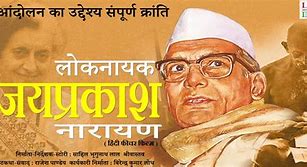Context:
The Prime Minister of India paid tribute to Loknayak Jaiprakash Narayan on his 122th Birth Anniversary.
About Lok Nayak Jaiprakash Narayan
- Jaiprakash Narayan was born on 11 October 1902, at Sitabdiara village in Saran district of Bihar.
- Giving up his studies in 1921, he participated in the Non-Cooperation Movement launched by Gandhiji.
- After completing his education abroad, when he returned to India in 1929 and joined the Indian National Congress (Congress Party) in 1929 on invitation from Jawaharlal Nehru and actively participated in the Civil disobedience movement.
- During the Quit India Movement of August 1942, Jaiprakash Narayan, along with Ram Manohar Lohia and Aruna Asaf Ali, led the movement after senior leaders were arrested.
- Though soon detained under the Defence of India Rules, he escaped prison on November 9, 1942, an event that became legendary in Indian history.
- He formed the “Azad Dasta” in Nepal to fight British rule through guerrilla warfare and sought collaboration with Subhash Chandra Bose.
- After India’s partition and Gandhi’s assassination, he withdrew from politics and joined Vinoba Bhave’s Bhoodan Movement and Sarvodaya campaign in 1954.
JP’s Social and Political Works
- He formed the Congress Socialist Party (CSP) in 1934 along with Acharya Narendra Dev, Minoo Masani and Achyut Patwardhan.
- In 1948, together with most of the Congress Socialists, he left the Congress Party and in 1952 formed the Praja Socialist Party with J. B. Kripalani.
- He was the first leader who launched successfully a mass movement in Bihar against corruption in public life.
- He proclaimed the Total Revolution or Sampoorna Kranti in the wake of the Bihar movement in Patna on 5th June 1974.
He used the term Total Revolution for the first time in a British magazine called The Time in 1969.
- Total revolution signifies a radical transformation not merely of our material conditions but also of the moral character of the individuals.
The concept of Total Revolution as enunciated by JP is a confluence of his ideas on seven revolutions i.e. social, economic, political, cultural, ideological, intellectual, educational and spiritual.
- Cultural revolution: It invokes a change in the moral values held by the individual or the group. Similar to Gandhi, he believed in purity of means based on moral and ethical values.
- Social-Economical revolution: A social revolution is basically an economic revolution in the Marxian formulation. However, JP held that in the Indian context, the term ‘social’ has a distinctive character. Thus, the Total Revolution pursued alongside an economic revolution, must aim to break caste barriers by introducing new norms and practices, such as inter-caste dining, abolishing dowry, and reforming marriage rules.
- Political revolution: In the sphere of political revolution JP follows Gandhi who visualised power rising from the grassroots and reaching the top as a reconstitution of power from the base. Thus, he placed emphasis on the decentralisation of power.
- This movement finally culminated in the proclamation of Emergency and subsequently in the victory of the “Janata Party” in 1977, which formed the first-ever non-Congress Government.
- He passed away at the age of 76 on 8 October 1979.
- As a tribute to this modern revolutionary, the Government of India posthumously awarded him the Bharat Ratna, the highest civilian award of the country in 1999.
Jaiprakash Narayan’s Ideology

- Popularly known as JP, he was a confirmed Marxist in 1929. By the middle of 1940s, he was inclined towards the Gandhian ideology.
- He was also greatly influenced by Gandhi’s non-violent weapon-satyagraha-against the oppressor.
- Till 1952, JP had no faith in non-violence as an instrument of social transformation process.
- He was a great proponent of socialism and his idea about socialism was depicted in his book “Why Socialism?”
JP suggests three interpretations of socialism:
- Fake Socialism or Communism: Established through methods of violence
- Democratic Socialism: Established by law through state power
- Spiritual Socialism: Established by changing the attitude and nature of people through voluntary efforts.

